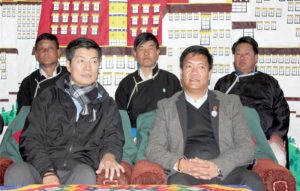 The Tibetan Rehabilitation Policy Act has been officially adopted by the Indian state of Arunachal Pradesh, reports tibet.net, the Central Tibetan Administration’s website.
The Tibetan Rehabilitation Policy Act has been officially adopted by the Indian state of Arunachal Pradesh, reports tibet.net, the Central Tibetan Administration’s website.
Shri Pema Khandu, Chief Minister of the state wrote a letter to Sikyong Lobsang Sangay, the President of Central Tibetan Administration, to confirm this development. “I am happy to inform you that in the cabinet meeting convened by me on 12 August 2017, I along with my colleagues decided to adopt and extend the Tibetan rehabilitation policy 2014 to the state of Arunachal Pradesh,” he said.
“Arunachal Pradesh has the fourth largest number of Tibetans in India. We have four Tibetan settlements Tezu, Miao, Tuting and Tenzingang. Therefore, in order to provide better opportunities to Tibetan youths residing in Arunachal Pradesh, my cabinet resolved to implement the Tibetan Rehabilitation Policy 2014 as framed by the Union Government of India,” he added.
President Dr Sangay thanked the State government of Arunachal Pradesh for confirming the implementation of the policy.
The Tibetan Rehabilitation Policy Act was announced in 2014. Since then several states including Himachal Pradesh, Karnataka, Uttarakhand have also adopted the policy.
As reported by Contactmagazine in 2014, the Tibetan Rehabilitation Policy makes clear the entitlements of Tibetans relating to their welfare in India. The guidelines include the extension of land lease agreements and the benefits available to Tibetans under central and state government welfare schemes. The policy also grants Tibetans the right to undertake economic activity and pursue any job for which they are professionally qualified; these can include nursing, engineering, accounting, medicine, etc.
Ten days after the adoption of the Act in Arunachal, the Arunachal Civil Society (ACS) objected to the decision saying it shows injustice and condemning the expenditure of “Extra funds for Tibetan refugees while neglecting the needs of indigenous tribes of the state”.
Pate Tayum, President of the ACS, said they are not against Tibetan refugees and their settlement in the state but that this policy “Will disturb the state’s ethnic balance, resulting in communal tension”. The ACS is a pressure group which says that every Arunachalee should enjoy his/her rights irrespective of background.
Arunachal Pradesh is the most north easterly state of India but claimed by China as a part of its territory. It has the highest number of regional languages in the Indian subcontinent.




 Print
Print Email
Email